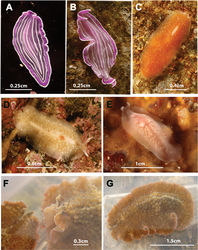Prostheceraeus roseus
| Notice: | This page is derived from the original publication listed below, whose author(s) should always be credited. Further contributors may edit and improve the content of this page and, consequently, need to be credited as well (see page history). Any assessment of factual correctness requires a careful review of the original article as well as of subsequent contributions.
If you are uncertain whether your planned contribution is correct or not, we suggest that you use the associated discussion page instead of editing the page directly. This page should be cited as follows (rationale):
Citation formats to copy and paste
BibTeX: @article{Noreña2014ZooKeys404, RIS/ Endnote: TY - JOUR Wikipedia/ Citizendium: <ref name="Noreña2014ZooKeys404">{{Citation See also the citation download page at the journal. |
Ordo: Polycladida
Familia: Euryleptidae
Genus: Prostheceraeus
Name
Prostheceraeus roseus Lang, 1884 – Wikispecies link – Pensoft Profile
Remarks
Prostheceraeus roseus belongs to the family Euryleptidae and is characterized by the following: an elongated, oval body shape and smooth surface; conspicuous marginal tentacles; cerebral eye clusters in two small, parallel rows that do not anastomose. This species is readily recognizable by its distinct pink to purple pigmentation with white longitudinal stripes and a white edge that runs along the entire body margin. The tubular, bell-shaped pharynx oriented frontally, and the digestive system well developed with numerous, anastomosing branches. The reproductive system shows the characteristics of the genus: male copulatory apparatus frontally oriented; penis armed with tubular pointed stylet and female complex with multiple uterine vesicles.
Distribution
Prostheceraeus roseus was one of the first species collected during this study, first in summer of 2010, then in autumn of 2013 (14/05/2010 and 10/10/2013). Two specimens were captured in the mouth of the Ria de Arosa in Corrubedo: one on a rocky wall in “Canteiro”, at a depth of 27 metres (42°30.5540N, 009°05.1260W), and the other on Pycnoclavella producta (Ascidiacea) in “A Dianteira”, at a depth of 23 metres (42°30.9100N, 009°04.3750W). Prostheceraeus roseus is also known from the Gulf of Naples, Italy (Lang 1884[1]). These findings represent the first record for the Atlantic coast outside the Mediterranean Sea.
Taxon Treatment
- Noreña, C; Marquina, D; Perez, J; Almon, B; 2014: First records of Cotylea (Polycladida, Platyhelminthes) for the Atlantic coast of the Iberian Peninsula ZooKeys, 404: 1-22. doi
Other References
- ↑ Lang A (1884) Die Polycladen (Seeplanarien) des Golfes von Neapel und der angrenzenden Meeresabschnitte. Eine Monographie. Fauna und Flora des Golfes von Neapel und der angrenzenden Meeresabschnitte, herausgegeben von der Zoologische Station in Neapel. Engelmann, Leipzig.
Images
|
